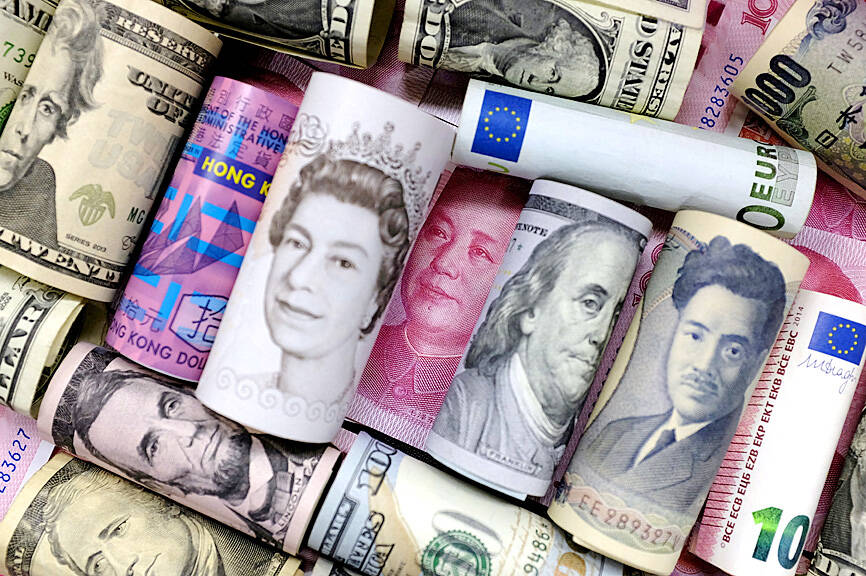Taiwan’s foreign exchange reserves at the end of last month continued to reach new highs on the back of an increase in returns from the central bank’s management of its investment portfolio, the monetary authority said on Friday.
The exchange movements of non-US dollar currencies against the greenback was another factor behind the foreign exchange reserve changes last month, the central bank said.
In addition, the value of foreign investors’ holdings of Taiwan-listed stocks and bonds, and New Taiwan dollar-denominated deposits also hit a new record high in a boom of the equity market, it added.

Photo: Reuters
The central bank’s data showed that foreign exchange reserves rose US$496 million from a month earlier to US$573.3 billion. It was the second consecutive month that the foreign exchange reserves increased, the data indicated.
Last month, the US dollar index, which tracks the currencies of Washington’s six major trading partners against the greenback, rose 1.14 percent, the central bank said.
The NT dollar lost 0.21 percent against the US dollar last month, while the yuan fell 0.61 percent.
The yen plunged 2.6 percent, the euro shed 1.16 percent, the pound fell 0.71 percent, the Canadian dollar lost 0.34 percent and the Australian dollar dropped 0.14 percent last month, the bank said.
Compared with other currencies, the NT dollar appeared resilient after volatility in April and May, so the central bank made limited efforts to intervene, Department of Foreign Exchange Director-General Tsai Chiung-min (蔡炯民) said.
At the end of last month, the holdings of Taiwan’s equities, bonds and NT dollar-denominated deposits by foreign investors rose to a new high of US$837.1 billion, which represented 146 percent of the country’s total foreign exchange reserves.
The ratio was also at the highest level, the central bank said.
Tsai said the record high in holdings by foreign investors reflected a highflying stock market last month as the TAIEX rose more than eight percent to top the 23,000 point mark in the month amid a frenzy about artificial intelligence.
The central bank’s data showed that Taiwan ranked as the world’s fifth-largest foreign exchange reserve holder, following China, Japan, Switzerland and India.
China remained the world’s largest holder of foreign exchange reserves, which fell US$9.68 billion to US$3.222 trillion at the end of last month as the yuan faced continued downward pressure amid a strengthening US dollar, the Chinese State Administration of Foreign Exchange said yesterday.

‘SWASTICAR’: Tesla CEO Elon Musk’s close association with Donald Trump has prompted opponents to brand him a ‘Nazi’ and resulted in a dramatic drop in sales Demonstrators descended on Tesla Inc dealerships across the US, and in Europe and Canada on Saturday to protest company chief Elon Musk, who has amassed extraordinary power as a top adviser to US President Donald Trump. Waving signs with messages such as “Musk is stealing our money” and “Reclaim our country,” the protests largely took place peacefully following fiery episodes of vandalism on Tesla vehicles, dealerships and other facilities in recent weeks that US officials have denounced as terrorism. Hundreds rallied on Saturday outside the Tesla dealership in Manhattan. Some blasted Musk, the world’s richest man, while others demanded the shuttering of his

ADVERSARIES: The new list includes 11 entities in China and one in Taiwan, which is a local branch of Chinese cloud computing firm Inspur Group The US added dozens of entities to a trade blacklist on Tuesday, the US Department of Commerce said, in part to disrupt Beijing’s artificial intelligence (AI) and advanced computing capabilities. The action affects 80 entities from countries including China, the United Arab Emirates and Iran, with the commerce department citing their “activities contrary to US national security and foreign policy.” Those added to the “entity list” are restricted from obtaining US items and technologies without government authorization. “We will not allow adversaries to exploit American technology to bolster their own militaries and threaten American lives,” US Secretary of Commerce Howard Lutnick said. The entities

Minister of Finance Chuang Tsui-yun (莊翠雲) yesterday told lawmakers that she “would not speculate,” but a “response plan” has been prepared in case Taiwan is targeted by US President Donald Trump’s reciprocal tariffs, which are to be announced on Wednesday next week. The Trump administration, including US Secretary of the Treasury Scott Bessent, has said that much of the proposed reciprocal tariffs would focus on the 15 countries that have the highest trade surpluses with the US. Bessent has referred to those countries as the “dirty 15,” but has not named them. Last year, Taiwan’s US$73.9 billion trade surplus with the US

Prices of gasoline and diesel products at domestic gas stations are to fall NT$0.2 and NT$0.1 per liter respectively this week, even though international crude oil prices rose last week, CPC Corp, Taiwan (台灣中油) and Formosa Petrochemical Corp (台塑石化) said yesterday. International crude oil prices continued rising last week, as the US Energy Information Administration reported a larger-than-expected drop in US commercial crude oil inventories, CPC said in a statement. Based on the company’s floating oil price formula, the cost of crude oil rose 2.38 percent last week from a week earlier, it said. News that US President Donald Trump plans a “secondary